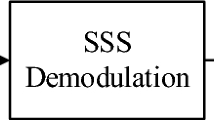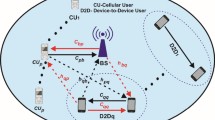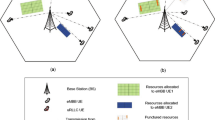Abstract
Considering the capacity gain of the secondary system and the capacity loss of the primary system caused by the newly accessing user, a distributed binary power allocation (admittance criterion) is proposed in dense cognitive networks including plentiful secondary nodes. The case that the secondary nodes can detect both transmitter and receiver of the primary system is analyzed first; considering that it is hard for the secondary system to detect the primary receiver without assuming the cooperation with primary system, the case that the secondary nodes only have the information about the primary transmitter is analyzed thereafter. In particular, we propose a simple estimation strategy to transform the problem of detecting primary receiver to the problem of detecting primary transmitter for the latter case. And a general power allocation scheme which is suitable for both of two cases is proposed afterward. By simulations, the restriction on the distance between secondary transmitter and primary receiver, and the restriction on the distance between secondary and primary transmitters are respectively achieved for the two cases. These two restrictions reflect that the capacities of both primary system and secondary system can be ensured to the predefined extents if these two restrictions on the distances are respectively satisfied in two cases.







Similar content being viewed by others
Notes
A SU may obtain the surrounding PUs’ spectral occupations by visiting the database or, as an optional choice, sensing the PUs’ RF.
Here, the larger the channel gain, the smaller the pathloss.
The reason is that: only one PU pair is considered in our considerations, while there are a large number of SUs are contained in the system; thus increasing/decreasing the transmission power of the PU pair will bring little effect on the final results.
References
Yang, J.: Spatial channel characterization for cognitive radios. Master’s thesis, Department of Electronic Engineering and Computer Science, University of California, Berkeley (2004)
Federal communications commission (FCC), spectrum policy task force.: Report of the unlicensed devices and experimental licenses working group. FCC Rep. ET Docket, no. 02-135, pp. 35–53 (2002)
Mitola, J., Maguire, G.: Cognitive radio: making software radios more personal. IEEE Pers. Commun. 6(4), 13–18 (1999)
Haykin, S.: Cognitive radio: brain-empowered wireless communications. IEEE J. Sel. Area Commun. 23(2), 201–220 (2005)
Bansal, G., Hossain, M. J., Bhargava, V. K.: Adaptive power loading for OFDM-based cognitive radio systems. In: Proceedings of the IEEE International Conference on Communications (ICC’07), pp. 5137–5142. Glasgow, Scotland (2007)
Wang, P., et al.: Power allocation in OFDM-based cognitive radio systems. In: Proceedings of the IEEE Global Telecommunications Conference (GLOBECOM’07), pp. 4061–4065. Washington, DC, USA (2007)
Attar, A., Holland, O., Nakhai, M.R., Aghvami, A.H.: Interference-limited resource allocation for cognitive radio in orthogonal frequency division multiplexing networks. IET Commun. 2(6), 806–814 (2008)
Cheng, P., Zhang, Z., Chen, H. H., Qiu, P.: Optimal distributed joint frequency, rate and power allocation in cognitive OFDMA systems. IET Commun. 2(6), 815–826 (2008)
Zhang, R.: Optimal power control over fading cognitive radio channels by exploiting primary user CSI. In proceedings of the IEEE Global Telecommunications Conference (GLOBECOM’08), pp. 931–935. New Orleans, LA (2008)
Kang, X., Liang, Y.C., Nallanathan, A.: Optimal power allocation for fading channels in cognitive radio networks under transmit and interference power constraints. In: Proceedings of the IEEE International Conference on Communications (ICC’08), pp. 3568–3572. Beijing, China (2008)
Kang, X., Liang, Y.C., Nallanathan, A.: Optimal power allocation for fading channels in cognitive radio networks: delay-limited capacity and outage capacity. In: Proceedings of IEEE 67th vehicular technology conference (VTC’08-Spring), pp. 1544–1548. Marina Bay, Singapore (2008)
Cheng, P., et al.: Analysis and optimization of power control in multiuser cognitive wireless networks. In: Proceedings of the IEEE international conference on communications (ICC’07), pp. 5395–5400. Glasgow, Scotland (2007)
Kim, D.I., Le, L.B., Hossain, E.: Joint rate and power allocation for cognitive radios in dynamic spectrum access environment. IEEE Trans. Wireless Commun. 7(12), 5517–5527 (2008)
Islam, M.H., Liang, Y.C., and Hoang, A.T.: Joint power control and beamforming for cognitive radio networks. IEEE Trans. Wireless Commun. 7(7), 2415–2419 (2008)
Mwangoka, J.W., Letaief, K.B., Cao, Z.: Statistical resource allocation for multi-band cognitive radio systems. Phys. Commun. 2(1–2), 116–126 (2009)
Chen, Y., Yu, G., Zhang, Z., Chen, H.H., Qiu, P.: On cognitive radio networks with opportunistic power control strategies in fading channels. IEEE Trans. Wireless Commun. 7(7), 2752–2761 (2008)
Le, L.B., Hossain, E.: Resource allocation for spectrum underlay in cognitive radio networks. IEEE Trans. Wireless Commun. 7(12), 5306–5315 (2008)
Jin, Q., Yuan, D., Guan, Z.: Distributed geometric-programming-based power control in cellular cognitive radio networks. In: Proceedings of IEEE 69th vehicular technology conference (VTC’09-Spring). Barcelona, Spain (2009)
Wu, Y., Tsang, D.H.K.: Joint rate-and-power allocation for multi-channel spectrum sharing networks with balanced qos provisioning and power saving. Mobile Netw. Appl. 14(2), 198–209 (2009)
Hoang, A.T., Liang, Y.C.: Downlink channel assignment and power control for cognitive radio networks. IEEE Trans. Wireless Commun. 7(8), 3106–3117 (2008)
Che, Y., Wang, J., Chen, J., Tang, W., Li, S.: Hybrid power control scheme in hierarchical spectrum sharing network for cognitive radio. Phys. Commun. 2(1–2), 73–86 (2009)
Caldwelland, W., Chouinard, G.: IEEE 802.22 wireless RANs draft recommended practice. http://www.mentor.ieee.org/802.22/dcn/06/22-06-0242-27-0002-draft-recommended-practice.doc
Zhao, Q., Sadler, B.M.: A survey of dynamic spectrum access: signal processing, networking, and regulatory policy. IEEE Signal Process. Mag. 24(3), 79–89 (2007)
Kiani, S.G., Gesbert, D.: Maximizing the capacity of large wireless networks: optimal and distributed solutions. In: Proceedings of the IEEE international symposium on information theory (ISIT’06), pp. 2501–2505. Seattle, Washington, USA (2006)
Kiani, S.G., Gesbert, D.: Maximizing multicell capacity using distributed power allocation and scheduling. In: Proceedings of the IEEE wireless communications and networking conference (WCNC’07), pp. 1690–1694. Hong Kong, China (2007)
COST 231.: Urban transmission loss models for mobile radio in the 900 and 1,800 MHz bands (Rev. 2). COST 231 TD(90)119 Rev. 2, Hague, Netherlands (1991)
Acknowledgments
This research was supported by the MKE (Ministry of Knowledge Economy), Korea, under the ITRC (Information Technology Research Center) support program supervised by the IITA (Institute of Information Technology Assessment) (IITA-2008-C1090-0801-0019).
Author information
Authors and Affiliations
Corresponding author
Rights and permissions
About this article
Cite this article
Zhao, C., Kwak, K. Comprehensive Capacity Ensured Distributed Binary Power Allocation in Dense Cognitive Networks. J Netw Syst Manage 18, 24–42 (2010). https://doi.org/10.1007/s10922-009-9147-z
Published:
Issue Date:
DOI: https://doi.org/10.1007/s10922-009-9147-z




